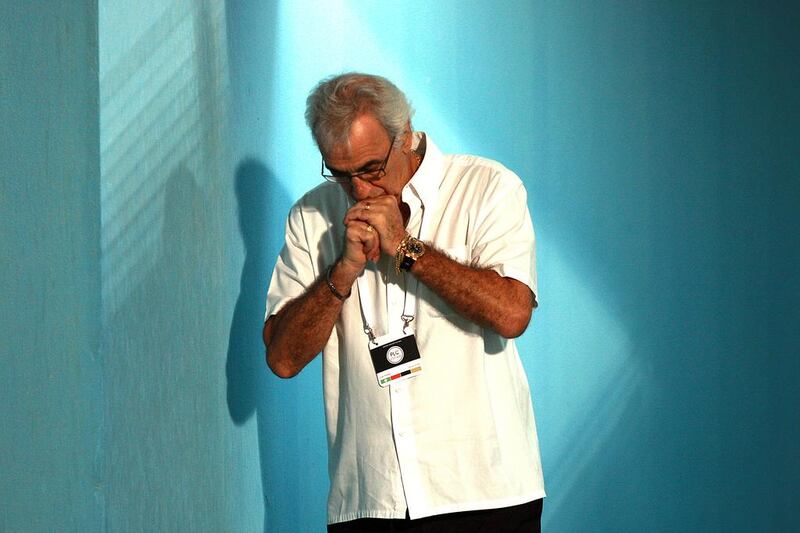A fresh identity, a fresh start.
After a four-month break, the UAE's newly-named Arabian Gulf League is back with a bang – and a fresh controversy.
Last season, the best domestic campaign in the short history of what was then the Pro League coincided with the emergence of the country’s best national team since the early 1990s.
A meaningless correlation or genuine interdependence?
We’re about to find out.
But one thing never changes. The managerial merry-go-round.
Even before a single ball had been kicked, champions Al Ain on Saturday parted ways with coach Jorge Fossati after less than two months in charge.
The timing of the Uruguayan’s departure will unfortunately overshadow plenty of significant issues on the pitch.
Al Ahli stated their intent to challenge Al Ain with a 1-0 win against Dubai on Saturday, thanks to an injury time goal by substitute Ahmed Khalil, and Sharjah also triumphed over Al Wasl by the same score.
Emirates were 3-2 victors over Al Dhafra, and Al Wahda were the lone home team to win, beating Al Nasr 3-2.
On Sunday, Al Shaab entertain the country’s third best team Al Jazira, Etisalat Cup winners Ajman host last season’s surprise package Baniyas and the President’s Cup finalist Al Shabab will look to take advantage of the chaos at champions Al Ain.
The wait for a permanent appointment at Al Ain can only add more drama to what is already a colourful domestic landscape.
Six of last season’s top seven clubs changed coaches in the summer and most have strengthened their squads.
Once again the spotlight will fall on the foreign contingent.
It is an eclectic list, with 53 registered non-Emiratis from 21 countries: France, Ghana, Brazil, Australia, Morocco, Senegal, Ivory Coast, Sierra Leon, Lebanon, Palestine, Argentina, Guinea, Kuwait, East Timor, Oman, Uzbekistan, South Korea, Portugal, Chile, Romania and Paraguay.
Brazil leads the way with 15 representatives. One in particular could prove the signing of the season.
Despite Saturday's bombshell, early indications from the Al Ain camp reveal that new Brazilian signing Michel Bastos has made an immediate impression on his new teammates.
Bastos’s preference to being an out-and-out winger rather than a wingback in a 3-5-2 formation could be one of the reasons for Fossati’s sacking.
Asamoah Gyan, the league’s top scorer for the past two seasons, is said to be overjoyed by the winger’s quality of passing and believes it will help him score even more than the 31 league strikes he recorded last season.
Intriguingly, Bastos also seems to have developed a fine understanding with the team’s main playmaker Omar Abdulrahman.
None of this will come as a surprise to anyone who has seen the 30 year old and his magical left foot in action.
Since 2009, the former Lyon man has represented Brazil 10 times and scored once, and was part of the 2010 World Cup squad.
It is fair to say that at one point he looked set to perform at the greatest stage of all – the 2014 World Cup in his home country.
Fans can expect quality of passing, crossing and shooting that few other players in the league can match.
Having sensationally snatched Cosmin Olaroiu from Al Ain, Al Ahli, meanwhile, will be looking for great things from their own marquee signing, Hugo Viana, a gifted Portuguese international from the lineage that produced Rui Costa, Luis Figo and Cristiano Ronaldo.
While his career may not have hit the heights of his illustrious countrymen, it has still been an impressive one and, at 30, he should have plenty left in the tank.
The popular but erratic Ricardo Quaresma could soon be a distant memory at Rashid Stadium.
Elsewhere, Al Nasr signed Australian international Brett Holman from Aston Villa, but failed in a bid to add Argentine striker Maxi Lopez, formerly of Barcelona and AC Milan.
At Al Jazira, Luis Milla has added the Moroccan midfielder Abdelaziz Barrada, for Dh47 million, and Chilean striker Nelson Valdez, both of whom spent last season in the Primera Liga.
Some of these names will be unfamiliar to many fans, which is not necessarily a bad thing.
Having had their fingers burnt in the past, Emirati clubs are more prudent with their signings, if not exactly with their managerial appointments.
Adding to the mix is potentially a new “golden generation” of Emirati footballers.
While it is far too early, and inaccurate, to declare a renaissance in Emirati football (where are the fans at stadiums?), few would argue that the current national team is the finest of the past two decades.
Last year’s excellent performance at the London Olympics, followed by the Gulf Cup triumph in January, have bestowed a new sense of credibility on Emirati football.
The league stands to reap the benefit.
Emirati clubs are still allowed only four foreigners on their books, one of which has to be from an Asian country, and this quota system seems to encourage young local talent.
The likes of Ali Kasheif, Amer Abdulrahman, Ali Mabkhout, Ahmed Khalil, Ismail Matar and the bushy-haired Omar “Amoory” Abdulrahman are as popular, if not more so, than any foreigner playing in the Emirates.
With next month’s Fifa Under 17 World Cup taking place across the Emirates and the senior side in a strong position to qualify for the 2015 AFC Asian Cup in Australia, the next nine months could be some of the most significant in UAE football history.
It’s time for the Arabian Gulf League to deliver on its own promise, although, one thing you can count on, there will be more managerial casualties along the way.
akhaled@thenational.ae





